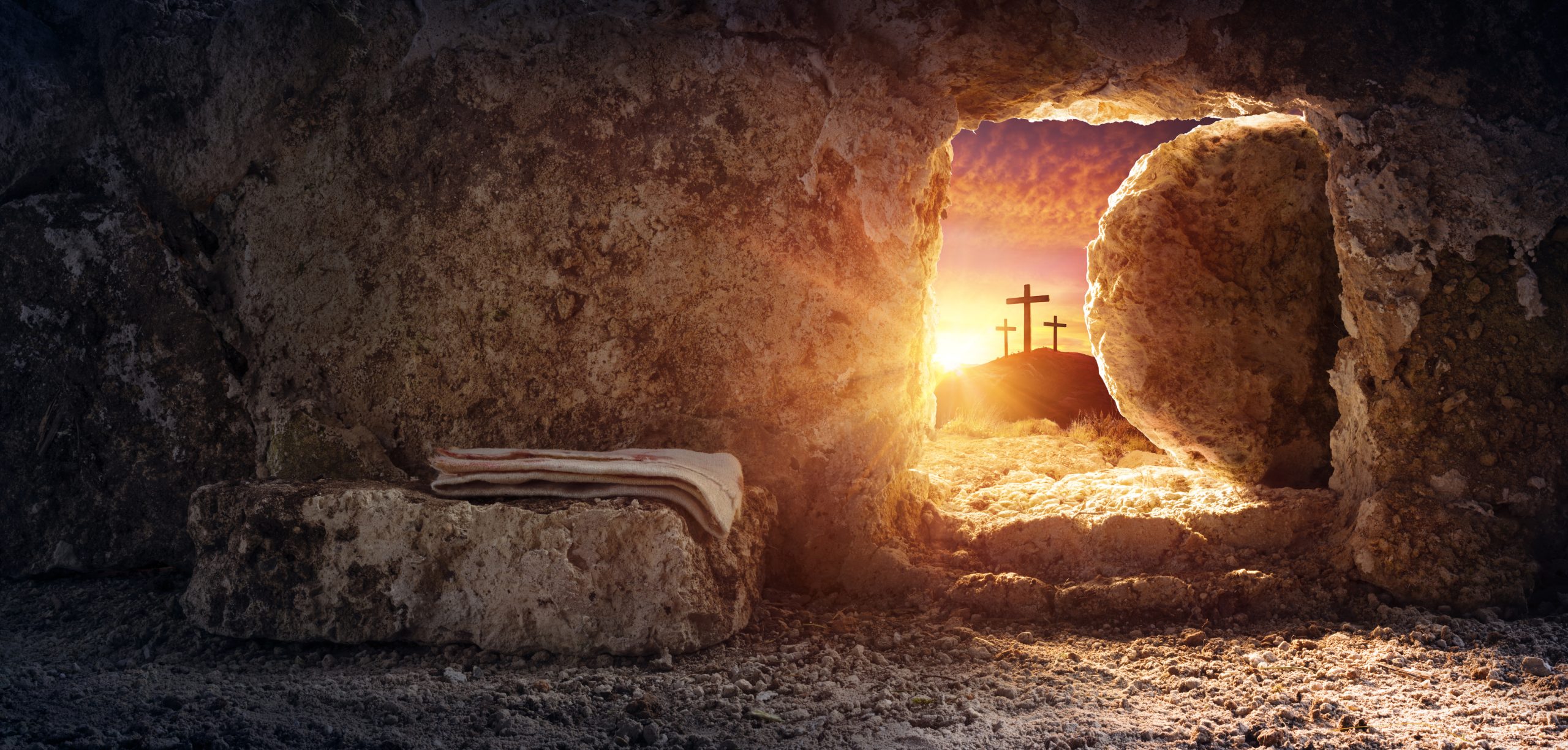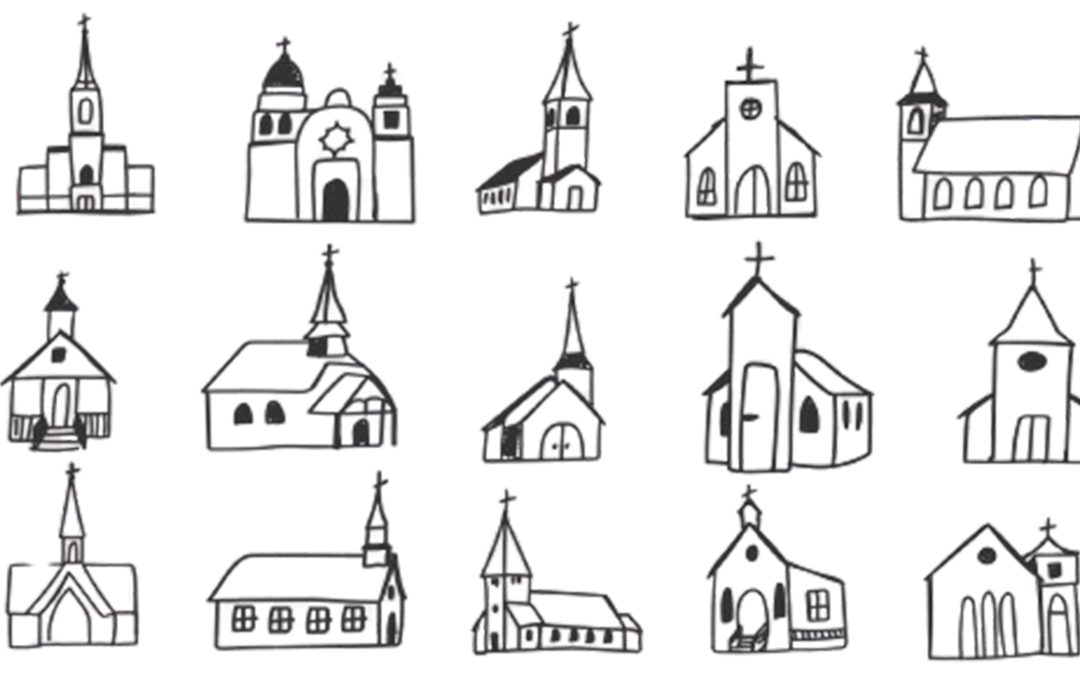To set the stage, let’s say you are invited to church by a friend from work. You politely, perhaps even curiously, take her up on it.
The service you attend is very different from those you attended in childhood. Or perhaps you’re checking church out for the first time. You take in the music, the message, the sights, the lights, the smells, and the bells.
Afterward, your friend invites you to lunch, and she asks, “Well, what’d you think?”
Your friend’s question, your reaction, and even your friend’s ability to invite you in the first place would all have been based at least partially on the “type” or “denomination” of the church you attended.
Other factors could also be at play. What country are you and your friend in? Is that different from the country you are both from? What year is it? And so on.

Let’s take our stage setting a step further. Maybe this service isn’t exactly your cup of decaf. It’s an hour from where you live, or much or all of it is in a language you do not speak. But, since you’re still a little curious, you think you would enjoy attending a church that solves either of these issues.
As you survey the church landscape, you’re met with a host of churches, chapels, fellowships, and campuses. First this and Second that. Some have steeples. Some of the steeples have crosses on them.
Some churches have majestic marble walls with stained glass windows. Others are in strip malls or converted movie theaters with the original carpet and chairs. Some might even meet in school cafeterias, sitting on folding chairs.
Some sing from songbooks, some have choirs, and some put on full-blown musical concerts. Some preachers play the keyboard or strap on a guitar and sing before they preach, and some services have no music at all.
What does it all mean? How did it get this way?
In today’s post, I will discuss what denominations are, how they came about, how much they matter, and how to choose one.
WHAT IS A DENOMINATION?
To denominate something means, in its strictest sense, to name something.
The American Heritage Dictionary defines a denomination as a large group of religious congregations united under a common faith and name, usually organized under a single administrative and legal hierarchy.
I have heard it said that the Bible tells us what God says about humanity, and religion tells us what humanity says about God. Because humanity is in the picture, yes, even Christian humanity, there is potential for error and abuse.
WHY ARE THERE SO MANY DENOMINATIONS?
Why are there so many denominations if there is only one God and only one biblical truth? Are they just regional? Do they disagree with one another? Are some right and some wrong? Are they all wrong? Now, we may be on to something.
I therefore, a prisoner for the Lord, urge you to walk in a manner worthy of the calling to which you have been called, with all humility and gentleness, with patience, bearing with one another in love, eager to maintain the unity of the Spirit in the bond of peace. There is one body and one Spirit—just as you were called to the one hope that belongs to your call— one Lord, one faith, one baptism, one God and Father of all, who is over all and through all and in all. (Ephesians 4:1-6)
Previously, I wrote an article called Church Shopping. In it, I explored the most important and basic elements you should look for in a local church. But how important is the denomination of any church? I suppose that depends on who you ask.
If you’re asking me, let me start by telling you where I sit before I tell you where I stand. I came to faith in a non-denominational church. Twelve years and a couple of states away, I still attend one.
In between, however, I have attended Calvary Chapel, Baptist, and Christian Missionary Alliance churches. That doesn’t include the churches I left mid-sermon or decided never to return to. Nor does it include the many other great churches that I never got to attend.
The Pastors and authors whose books and sermons I read and listen to the most tend to be (in no particular order) Presbyterian, Baptist, Anglican, and Lutheran.
As far as denominations go, so far, I appear to have ended where I had started. That is not because I’ve been unable to recapture the ‘magic’ of my first church. On the contrary, these and others were terrific churches. I could have attended them for years.

The more familiar I became with the Bible, however, the less I felt attracted to a specific denomination. Though there are several I do not avoid, there are several more that I do.
All that said. What does it all mean?
Rather than give you an exhaustive history of denominations and their origins, I want to review three historical examples of disagreements within the Church. Note the differences in the way the disagreements were resolved.
By examining these events, we can hopefully see how denominations come about. Then, we’ll discuss how to negotiate the seemingly endless choices.
THE JERUSALEM COUNCIL
If we look at the Old Testament, which I recommend, we see God creating a single type of worshiper and religion He named Israel. He cast them among an existing lineup of pagan religions to contrast Himself and His worshipers with those of the little ‘g’ gods.
God personally gave them laws, a leadership hierarchy, the first Bible camp, food, water, then land, etc. These were the Jewish people.

FAST FORWARD
By Jesus’s day, some 1,400 years (and 40 books) later, there were several sects (or denominations) of Judaism (Israel), all reading from the same scrolls of God’s Law. The Bible mentions (in no particular order) Pharisees, Sadducees, Essenes, and Zealots.
About 35 miles north of Jerusalem, there was another Torah-following Jewish sect called the Samaritans. They were considered impure half-breeds by ‘traditional’ Jews.
Given time and people, two things that insist on their influence, the core teachings of the Hebrew Bible (the Christian Old Testament) had evolved. But the Bible itself hadn’t changed.
Heaven and earth will pass away, but my words will not pass away. (Matthew 24:35)
Some Jews were worshiping the Law more than they worshipped God. They idolized the Law. Interestingly, the Jews angered God with idolatry in the Old Testament as well.
Jesus publicly rejected the teachings and behavior of the religious leaders of His day. Things had all gone wrong, but He was there to make things right.
In the end, some understood the truth and would move forward with Jesus. Some did not, and those who did not would kill Him.

Ultimately, Jesus’s ministry and His appointment of twelve church heads (with a bit of help from the Holy Spirit) launched the largest religion the world would come to know. It was called the ‘way.’
It would later be called Christianity. I guess it polled better. Some would call it another Jewish sect. Others would call it blasphemy.
It wasn’t long before the Apostle Paul and his fellow traveler, Barnabas, had disagreements with the first Christian spinoff: the Judaizers.
The Judaizers insisted that the Gentiles had to get circumcised en route to a life of Christ-following.
This was a core doctrinal dispute: What saves us, Jesus or Jesus plus circumcision? Paul and Barnabas immediately took the matter to the council in Jerusalem.
There, the apostles (the church heads we talked about earlier and Paul) and elders debated it, consulted Scripture, discussed Jesus’s first-hand teachings, and came to a consensus—an Apostolic Council.
For where two or three are gathered in my name, there am I among them. (Matthew 18:20)
Luke published their opinion in chapter 15 of the Book of Acts. Basically, this Jerusalem Council issued an official letter rendering their judgment: Dear Gentiles, these men don’t speak for the Church. Kindly ignore them. Welcome to the kingdom (Acts 15:23-29).
Their judgment brought clarity to the Church. The church leadership maintained the proper orientation of church doctrine and, by implication, simultaneously made heretics out of the Judaizers.
THE GREAT SCHISM
About a thousand years and a half a billion people later, the universal and catholic (little ‘c’) church had spread across the known world.
Church leadership in the Latin-speaking Roman West and the Greek-speaking East had disagreed over doctrine, leadership, and politics for centuries.
The imperial seat of Rome had moved to Constantinople in the 4th Century, and Rome fell in the 5th Century. The Christian Church was geographically, politically, and culturally divided.
In 1054 AD, Rome’s insertion of the phrase “and from the Son” (Latin:filioque) into the Nicene Creed (from a Council held in the 4th Century) was a non-starter for the East. On top of that, Rome insisted on (a policy of) clerical celibacy.
Pope Leo IX in Rome and Patriarchate Michael Cerularius in Constantinople excommunicated one another from… the church. This meant that our people couldn’t go to your church, and your people couldn’t come to ours.
Leo closed down all of the Greek-speaking churches in Rome, and Michael closed all of the Latin-speaking churches in Constantinople.
Suddenly, we had two Christian churches: the Roman Catholic (big ‘C’) Church of the Latin West and the Greek-speaking Orthodox Church of the Eastern Roman (later called Byzantine) Empire. Two freshly minted denominations, and never the twain shall meet.
THE REFORMATION
Some 500 years later, Roman Papal authority informed every corner of Western Europe.
In 1517, a German priest named Martin Luther waged a written complaint about Papal overreach by nailing his complaint, which came to be known as the 95 Theses, to the door of the All Saints’ Church in Wittenburg, Germany.
Though Luther wasn’t the first to raise the same issues, his overt act garnered attention among the German citizenry, the Catholic clergy, and Pope Leo X (not to be confused with Leo IX) himself.
Luther’s complaints, like those of John Wycliffe (the first English Bible translator) over a century earlier, centered around non-biblical powers that were seized by Catholic leadership, especially the Pope.
These powers included, but were not limited to:
- The Church’s sale of Plenary Indulgences—purchasable documents that promised early release from purgatory for the purchaser or the purchaser’s loved one.
- The Pope’s granting of forgiveness for sins.
- Use of the merit of past Christians (the treasury of merit) to grant such forgiveness.
Once again, a Pope named Leo would not see his man-granted authority challenged, and he subsequently excommunicated Luther.
For fear of his life, Luther went into hiding under the protection of his supporters. During his exile, he translated the Bible into German, just as the printing press was changing book publication forever.
Contemporary preachers championed bold teachings based on the Gospels. They were called Evangelicals, named after the Greek word for Gospel, Evangelion.
Within a decade, Luther’s teachings inspired five imperial princes and fourteen imperial cities to file a defense of Luther, called a protestatio. Supporters would later become mockingly referred to as Protestants.
Only 12 years after Luther posted his theses, Luther and Swiss theologian Huldrych Zwingli, both now no longer Catholic, had a theological disagreement over transubstantiation.
Luther’s argument ‘for’ was that the substance of communal bread and wine literally transformed into Jesus’s body and blood without changing in taste, smell, or texture.
Zwingli’s argument ‘against’ was that the sign and the thing signified were not the same.
During the debate, Luther declared, “Our spirit has nothing in common with your spirit.” Zwingli’s followers began calling themselves “Reformed” as a declaration of their true reformation over the Lutherans.
On and on the disagreements, splits, and divisions went until today, only 500 years later, the number of denominations has swelled into the tens of thousands.
WHO’S IN CHARGE?
The above examples examine a few incidences of doctrinal disagreements within the Christian Church and how they were handled.
With the Jerusalem Council example, undisputed church leadership dealt with disagreements Scripturally, issues were resolved, and unity was restored.
When church leadership was disputed because it evolved or emerged from systems outside of Scripture, like political or state power, their opinions were not as widely accepted. Subsequently, nothing was resolved.
Strict adherents to the Bible raise their voices and pose or defend challenges. If the challengers and the challenged cannot reach agreement, however, theology divides, and congregants are left having to pick sides.
THE LEADERSHIP PROBLEM
In Paul’s day, there was no dispute among Christians as to who was in charge of church organization and church discipline. It was Jesus’s personal appointees, or apostles, who were tasked with spreading His Church (Matthew 28:18-20).
As all of the Apostles except John were put to death, their disciples would fill the leadership vacancies. Though some denominations swore by this succession of apostles, others did not. Ultimately, time and people brought with them disagreement, scandal, and politics.
Rather than simply relying on Jesus’s teachings and those of His appointees, humanity demonstrated a persistent desire to challenge and update their teachings. Human influence.
Across centuries of persecution, church politics, church corruption, and unending jockeying for power, various leadership structures emerged, some good, some not.
THE UNSOLVABLE PUZZLE
Unfortunately, where there is a church, there are people. I’ll say it again: the worst thing about Christianity is Christians.
Look at the problems. Church leaders insist on their rulings, but not always because they are biblically right. Sometimes, they just want their way because they’re in charge, irrespective of what the Bible says.
Where there is a splitting of the church, there is usually disagreement over biblical interpretation or lack thereof.
Sometimes, the core denomination attempts to retain biblical purity by refusing to follow the dissenting opinions. Other times, a group will split off to retain the biblical purity that the original group had strayed from.
Because the Christian Church contains and is run by Christians, it will never perfectly resemble Jesus Christ this side of heaven, though He still calls us His bride (Ephesians 5:25-27; Revelation 19:7-9).
God instituted His kingdom on earth as it is in Heaven (Matthew 6:10) through Jesus, the Holy Spirit, and the Church. Like His Law and His Gospel, however, where human involvement and influence were present, mistakes were not far behind.
HOW DO I PICK A DENOMINATION?
Unfortunately, no human denomination has a claim on the truth. But we cannot use that as an excuse to not go to church.
No denomination can say they are right, and everyone else is wrong. This is because most denominations are right on the essential things:
- Bible—inspired word of God and should be read (2 Timothy 3:16-17). Bible is infallible (2 Peter 1:19-21).
- Christology—who Jesus is. 100% God, 100% man, aka the hypostatic union (Matthew 2:1; Hebrews 1:3). Co-eternal with the Father (John 1:1). Born of a Virgin (Luke 1:34). Died for our sins (1 Peter 2:24). Was resurrected from the dead (Revelation 1:18).
- Soteriology—what saves us. We are saved by grace, through faith (Ephesians 2:8-9). Through Christ alone (John 14:6; Acts 4:12).
- Eschatology—what happens at the end times. Jesus will return (Acts 1:11). Humanity will be judged (Hebrews 9:27; 2 Peter 3:7).
- The Gospel—a proper Soteriology is based on a proper biblical Gospel.
- The Trinity—One God. Three persons (Matthew 3:16-17; 28:19).

You may have noticed from the list above that the decision should be driven by your knowledge of Scripture.
You should only consider attending services of denominations that adhere to sound biblical principles. Beware of what are called works-based religions—those that elevate people for their good deeds. Jesus plus anything is a false gospel.
It is incumbent upon every Christian to understand Scripture (Joshua 1:8) and its truth, then live out that truth in their own lives and interactions. The same responsibility applies to choosing a denomination and a church.
For reasons that I covered in a previous article, I do not believe that not choosing a church is a viable option.
Even if you study a denomination’s origins and faith statement, the result of your studies does not guarantee that you will find a good church under that banner. You cannot take it for granted that the essentials will be present.
Here is how I found a new church when I moved to Tulsa, Oklahoma in 2021.
Some estimates place the number of churches in Tulsa at nearly 2,000. This was encouraging… and a little overwhelming.
As I drove around my new town, when I noticed a church of a denomination I was comfortable with, I would read the name of the church into a reminder list on my phone. When I got home, I would go to each of the church’s websites and begin researching it.
If they did not have a website, I would take them off my list. It’s the 21st century, after all. In my opinion, such as it is, not having an informative website could be a sign of either laziness or poor management.
If they had a website, I researched the church’s statements of faith and/or foundational principles (which are not necessarily aligned with those of their respective denominations). This research is especially important in the case of a non-denominational church.
When that was complete, I watched or listened to that church’s most recent sermons or sermon series. I looked for proper and regular Bible teaching, especially Gospel teaching.
Once my investigation was satisfied, it was time to do the thing. It was time to visit these churches personally.
I was careful to be attuned to the people who went there. Are they being taught well? Are they being taught to live what they’re taught? How important is the denomination to them?

The denomination shouldn’t be valued more than Christianity. The head of any Christian church is Christ, without exception. Put another way, is the church’s identity in Jesus Christ or in its faith system?
And he is the head of the body, the church. He is the beginning, the firstborn from the dead, that in everything he might be preeminent. (Colossians 1:18)
The fact that there are multiple denominations can mean that the Church is hard at work maintaining its foundations in truth and purity. On the other hand, it could mean that the body of Christ may never get its act together.
We don’t know what it all means, but God does. None of this is a surprise to Him. Though many more denominations would result, Christians were given the opportunity and the responsibility to search God’s word for themselves and avoid false teachers.
I appeal to you, brothers, to watch out for those who cause divisions and create obstacles contrary to the doctrine that you have been taught; avoid them. (Romans 16:17)
Even if the false teaching comes from somewhere as large and as seemingly authoritative and ‘trustworthy’ as the church itself, we are responsible for spotting and avoiding false teachers (2 Corinthians 11:13-15; 1 John 4:1; 2 Peter 2:1).
From a story in Genesis 11:1-9, we learn that one day, people decided to be as great as God and began to build a tower that reached to the heavens:
“The Lord said, ‘If as one people speaking the same language they have begun to do this, then nothing they plan to do will be impossible for them. Come, let us go down and confuse their language so they will not understand each other’” (Genesis 11:6-7).
Perhaps this lesson, like so many others in scripture, explains our world today. Perhaps we are to glean from this story that God sees value in stopping a human enterprise, any human enterprise, from becoming too big.
Perhaps all the many denominations in existence today, like so many things before them, are all part of God’s plan.
Has mankind gone wrong in creating so many Christian denominations? If humanity has gone wrong, then we are not acting in accordance with God’s teaching or His will, but I dare say we are still acting in accordance with God’s plan.
In any case, the work is necessary. If you find narrowing down the ‘perfect’ religion impossible, try doing what I did: go without one. Just go to church.
Scripture quotations are from the ESV® Bible (The Holy Bible, English Standard Version®), copyright © 2001 by Crossway, a publishing ministry of Good News Publishers. Used by permission. All rights reserved.

